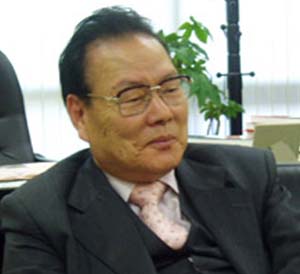
The younger generation may be unfamiliar with the name Lee O-young. Among other achievements, he was the former Minister of Culture and Tourism, Professor of Ewha, culture critic, editorial consultant of Joong Ang Ilbo, and prolific novelist. Diverse professions in many fields might give us a glimpse into his colorful life. He is now in his 70s, but his quest for knowledge still sparkles in his eyes. Now he has now coined a new term ?igilog?indicating a paradigm shift in the digitalized world.
The book Digilog discusses the polarization of digital and analog world and warns of the graveness of the matter. Lee takes cyberspace as an example of the digitalized world. ?yberspace is the extension of the brain, not the body.?According to Lee, we only rely on machinery information, so, our senses, which are the analog part of our body, become segmented. Digilog therefore, aims to unite the separated body and soul, making an integral society in the end.
Some might question whether Digilog is just another abstract idea separated from real life. However, it is not simply a play on words; rather it can be applied to real products we use in our daily lives. iPod, which links the offline music player with online music sites, is an example of the Digilog idea. Lee says that contemporary digital technology tries to become closer to the human body, which is an analog entity, and when something digital is accessible anywhere and anytime, it becomes ubiquitous in the world.
Despite the prevalence of digitalization in the world, Lee says that among the five senses, only taste cannot be digitalized. On the Internet and computer usage, there are many brand names and expressions related to food, such as the Internet Cafe, Apple computer, java program, and even a mobile phone named Chocolate Phone. Lee explains, ?he distance between food and oneself evaporates while eating. Ironically, we destroy the food when we eat, but we wholly realize oneness.?He adds, ?his is why Jesus gave bread and wine in the last supper, and this is why lovers call each other ?oney?or ?weetheart.??edia is taste,?says Lee. Up until now, food was viewed as an economical resource, but according to Lee, food is the most powerful way of communication. Lee says that from now on, digital information has to be made edible, and he used a new term ?angible bit?to indicate something that can be touched as well as eaten. Lee explains, ?or the digital world to become fully Digilog, it has to include the sense of taste, which is the last sense that could be digitalized.?When looking into Korean culture, we see that there are many food related words used in all areas of life. As an illustration Lee says, ?f bibimbop is an orchestra, a Western meal is a solo.?This is because bibimbop creates a new taste as it is mixed altogether, but Western food has to be eaten separately according to the course of the meal.
As Lee praises taste, he carries out his new theory that taste is the integral sense. He further states that the so-called information society is calling for the ability to cross over borders of different fields. ?s Koreans have rich cultural DNA inclined to combine different things altogether, we can be the leader of the upcoming Digilog Age,?says Lee with a bright prospect of the future.
With a funny wordplay, Lee finally concludes his lesson on Digilog. ?est took away thousands of lives in the Medieval Age. In the current Digital Age, politics, economy, socioculture, and technology, combining the first letters of each word is a pest. In the Digilog ANge, the future ?est?should stand for poetics, ecology, smart, and thinking.?He goes on with his enthusiastic speech and says that if we change the order of the word pest, it becomes ?tep.?He concludes, ?ow Digilog is the next step for the 21st century.?

